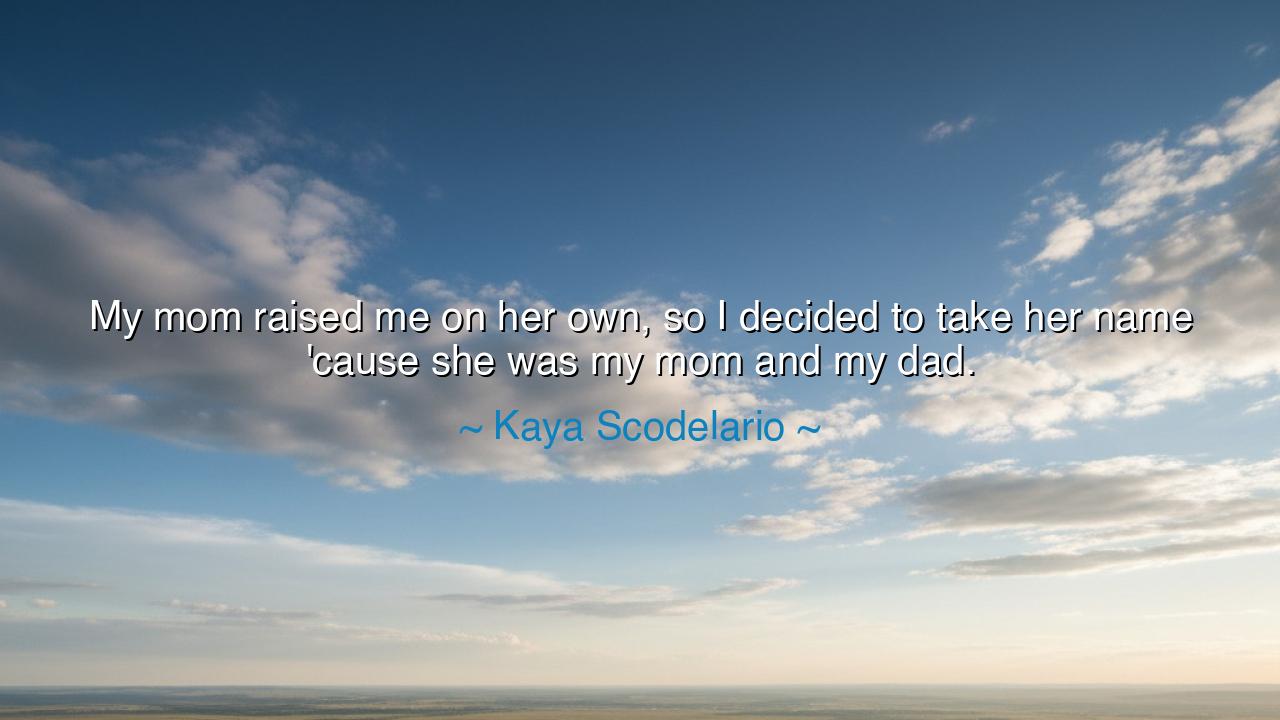
My mom raised me on her own, so I decided to take her name 'cause
My mom raised me on her own, so I decided to take her name 'cause she was my mom and my dad.






In the words of Kaya Scodelario, we hear a declaration not of rebellion, but of reverence: “My mom raised me on her own, so I decided to take her name, ’cause she was my mom and my dad.” This is the cry of a soul shaped by devotion, of a child who has seen the quiet heroism of motherhood and recognized in it something divine. Beneath this simple statement lies the story of sacrifice, identity, and the eternal power of love that endures alone. It is the story of every woman who bore the burden of two hearts — her own and her child’s — and of every child who later looked back and saw, at last, the magnitude of that love.
In ancient times, the heroes of legend often owed their greatness to the gods. Yet here, the god is a mother, mortal yet transcendent, whose strength is forged not in temples but in kitchens, schools, and sleepless nights. When Kaya speaks of taking her mother’s name, she performs a sacred act — the reclaiming of lineage not by blood alone, but by devotion. To take a name is to declare one’s origin, to choose one’s truth. And in that choice lies a wisdom older than any empire: that honor belongs not to those who give life, but to those who nurture it.
In the tale of Demeter and Persephone, the goddess of harvest loses her daughter to the underworld, and the earth itself grows barren in her grief. Yet her love is so fierce, her will so unyielding, that even Hades must relent, allowing Persephone to return to the world above for part of each year. From that myth we learn this: a mother’s love is not bound by nature or circumstance — it reaches through darkness itself. Likewise, in Kaya’s words, we feel that same eternal devotion — the kind that labors unseen, that endures absence and hardship, and yet gives warmth to life itself.
There is something profoundly heroic in the single parent who stands where two once stood. Such a figure is both sun and moon, day and night, laughter and discipline — a whole world condensed into one beating heart. Kaya’s choice to bear her mother’s name is an act of restoration, a setting right of the cosmic balance. She declares, “You were both my mother and my father, and so your name is now my banner.” In that choice, the lineage of love surpasses the lineage of blood.
Consider also the story of Abraham Lincoln, who often spoke of his stepmother, Sarah Bush Lincoln, with deep affection. She was the one who nurtured his mind, taught him to read, and filled his life with kindness after the loss of his birth mother. Lincoln said of her, “All that I am, or hope to be, I owe to my angel mother.” His greatness, like Kaya’s gratitude, was born from a woman who gave not just care, but faith — faith in a future she might never see, faith in a child who would someday stand upon the world she built.
The meaning of Kaya’s words, then, is not confined to her alone. It speaks to every soul who has been shaped by love rather than circumstance, to every child who found strength in the quiet endurance of a parent who never gave up. It tells us that family is not always determined by the laws of flesh, but by the bonds of heart. Her decision to take her mother’s name is not only homage — it is an act of transformation, the moment when gratitude becomes identity.
Let this teaching be carried forward: Honor those who built you from their own sacrifice. When you speak your name, remember whose labor made it possible for you to stand. If you were raised by one who bore many burdens, let your life become their legacy. Names, after all, are more than symbols — they are vessels of memory, mirrors of love, and monuments of gratitude.
Action for the living: Take time to speak the names of those who raised you, not in passing but with reverence. Write their stories. Tell them — or the world — what they mean to you. If they still walk the earth, thank them with your voice; if they do not, honor them with your deeds. Carry their spirit forward, not in shadow, but in pride. For to claim their name, as Kaya Scodelario did, is to proclaim to the world: “I am the child of endurance. I am the heir of love.”






AAdministratorAdministrator
Welcome, honored guests. Please leave a comment, we will respond soon